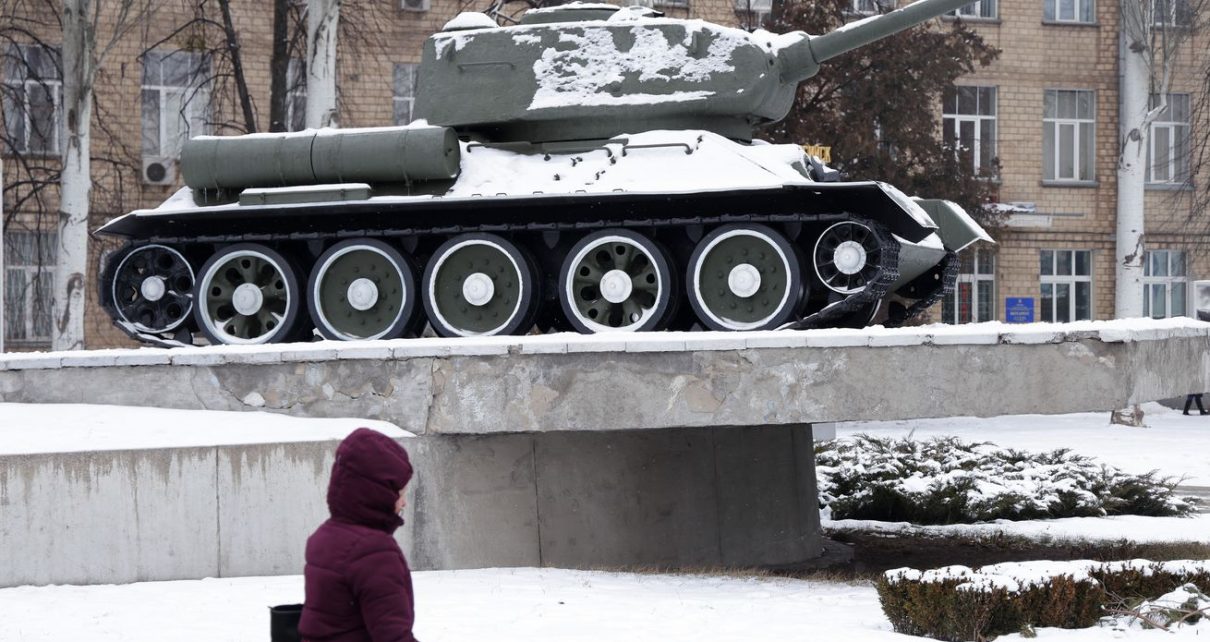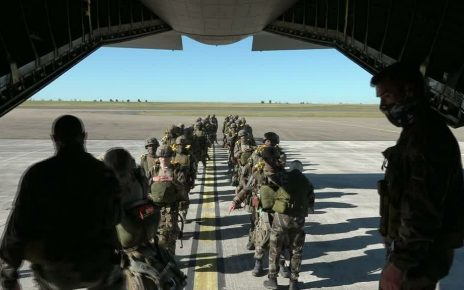
A Ukrainian journalist on the Kremlin’s escalation, NATO, and a former president’s treason charges.
“Nothing about Ukraine without Ukraine” is a line you often hear from Western officials as they struggle to find a diplomatic offramp to Russia’s military buildup around Ukraine.
But Ukraine, the country at the center of all this — the one that would actually be invaded (again) by Russian forces — sometimes seems like a bit player in a greater geopolitical drama, with Moscow and Washington the stars. This is largely by design, because, when it comes to NATO, Russian President Vladimir Putin sees America as the main actor.
Ukraine gets this, too. Kyiv is hosting a rotating cast of European and US officials, and receiving arms shipments (plus some helmets) by the day, but Ukraine also sees Russia using this escalation to extort larger concessions from the West. Ukraine, better than anyone, understands it isn’t joining NATO anytime soon.
“In Ukraine, this is seen as one of the fake conditions that Russia is trying to bring to justify their aggression,” says Oleksiy Sorokin, the political editor and chief operating officer of the Kyiv Independent, an English-language media outlet that formed in November after journalists from the Kyiv Post were fired after pushing back against what they saw as editorial interference by the Post’s owner.
Which is why the mood in Ukraine hasn’t exactly reached a fever pitch of panic over a possible Russian incursion. The relative calm, Sorokin said, is because Ukrainians constantly face threats and meddling from Russia, especially after Moscow’s 2014 invasion. And beyond Russia, Ukrainians have their own domestic politics to worry about, including, right now, the charges of treason against a former president. That case is bringing up renewed questions about President Volodymyr Zelensky, an outsider who came in promising to strengthen the rule of law and crack down on Ukraine’s longstanding problems with corruption. “There’s been an extremely big centralization of power going on,” Sorokin said. “And there’s a lot of warning signals and markers that allow us to believe that Zelensky is not really true on his word of fighting corruption.”
Sorokin offered Vox the view from Ukraine about Russia’s escalation and the prospect of conflict, and how that has — and hasn’t — affected Ukraine’s domestic political divisions and turmoil.
Our conversation, edited and condensed for clarity, is below.
Jen Kirby
Over here, it feels like we’re constantly hearing the drumbeats of war. What is the mood in Ukraine, as much as you can sum up?
Oleksiy Sorokin
I think, obviously, after the recent comments by the US, the comments coming from the UK, some people are worried. I know a lot of my friends who don’t follow politics are now asking me questions: “Is Russia actually going to invade?” But on the streets, in general, people carry on with their lives, because for many Ukrainians, we’re accustomed to war.
For eight years, Russia has been invading Ukraine, has been trying to meddle with Ukrainian internal affairs. So having Russia on our tail, having this constant threat of Russia going further — I think many Ukrainians are used to it. That’s why we’re probably more calm than some people in the West.
Jen Kirby
That’s fair enough! You mentioned recent comments from the US. I feel like there’s been so many comments; is there anything in particular you’re referring to?
Oleksiy Sorokin
Yes. I think the comments coming from President Joe Biden that a “minor incursion” would be less of a big deal, and cause internal conflict for NATO members. That’s the comment that struck many Ukrainians because for us, we are already at war with Russia, and having a US president saying that, well, some invasion is less costly than others, got a lot of people in Ukraine worried.
But we know that the presidential administration then went back on their comments saying that actually any move into Ukraine would be considered an invasion, and I think for many people that calmed the Ukrainian community, and a lot of Ukrainian politicians as well.
But also, if we’re talking about comments by the American side, we see that Ukrainian officials, they tend to say that nothing unusual is happening, that everything is fine, that we are continuing business as usual, we know that everything is okay. And then we have the American officials, for example, Jen Psaki saying that Russia will invade, we see Biden saying that Putin has to do something already. Those comments are getting people worried.
The problem that we’re facing now is that Ukrainian officials are trying to calm people down, and Western officials are heating up [the threat].
Jen Kirby
That’s interesting. I wonder, from your perspective as a journalist, do you think that Ukrainian officials are underselling the threat, or are Western officials overselling the threat of a Russian invasion?
Oleksiy Sorokin
I think it’s both. I think that the truth is somewhere in the middle. There’s obviously an increased threat of Russia launching a full-scale invasion. But I would say the comments coming from particularly the US are kind of going overboard, because we see that every day or every two days, American officials are saying that Russia will invade. And I know that they might have some kind of intel that we in Ukraine don’t have. But I still think that those comments are causing — I wouldn’t say panic — but some worries, not only [for] the Ukrainian public, but also some politicians.
Jen Kirby
What is the perspective on some of Russia’s demands, most notably Putin’s request that NATO doesn’t expand eastward and so denies Ukraine membership? I know the US and its allies have said that this is a nonstarter, but I wonder if the US and Russia came to some sort of agreement on keeping Ukraine out of NATO, what the reaction might be?
Oleksiy Sorokin
I think, well, it’s not even that I think, there are polls that say that most Ukrainians want to join the European Union and NATO. So I would say that for Ukraine, having a condition of never joining NATO is just an impossible condition to follow. What I would say is that this whole conflict was caused by Russia wanting Ukraine out of NATO, Ukraine wasn’t a part of NATO, and in the near future, everybody understands that Ukraine is not going to join. First of all, because Ukraine already has a war [with] Russia; second of all, corruption. A lot of other things that keep Ukraine from NATO.
This whole notion, this discourse of basically Russia causing an escalation to keep Ukraine out of NATO, is wrong, because Ukraine wouldn’t join NATO in the near future. So this is just like, in Ukraine, this is seen as one of the fake conditions that Russia is trying to bring to justify their aggression. But the real reason for Russian aggression is that Russia denies Ukrainian statehood. Even if NATO says that Ukraine won’t join NATO in the year, the next 10 years, realistically, nothing would have changed, because Ukraine wouldn’t have joined anyway.
Jen Kirby
I am curious about Ukraine’s internal dynamics. It seems that Zelensky, the president who was elected in 2019, is extremely unpopular.
Oleksiy Sorokin
Well, he’s actually very popular. I wouldn’t say he’s extremely unpopular. He’s the most popular politician in Ukraine.
Jen Kirby
But his poll numbers have been in the 20s!
Oleksiy Sorokin
For Ukraine, that’s extremely popular. If a sitting Ukrainian president has over 20 percent of total support, he’s the most popular person. In Ukraine, only one person was reelected. So yes, that’s considered very high numbers.
Jen Kirby
Got it. So then why is Zelensky still the most popular politician in Ukraine?
Oleksiy Sorokin
Well, oddly enough, Zelensky is still considered a new guy, and he still doesn’t have this long tale of past misfortunes as a politician. For example, his main opponent [Petro] Poroshenko, despite being only president for like five years [from 2014-2019], he was a politician since the early 2000s. So with him, he’s considered this established politician. But as for Zelensky, he’s still considered this new guy in town, and a lot of people still have high hopes for him as a politician, as opposed to his main opponents.
Jen Kirby
That former president you mentioned, Poroshenko, is basically being accused of treason. What’s going on there?
Oleksiy Sorokin
Well, yes, this is a very interesting case, because it’s developing amid the ongoing Russian military buildup, so many people are saying that this case is happening in the worst possible time. But actually, it’s ongoing for several years. It’s just Poroshenko who was charged with high treason in December.
The substance of this case is basically: when Poroshenko was president, he allowed the import of coal from Russian-occupied Donbas, which the current prosecution says was helping Russian-backed militants in eastern Ukraine to get financing. That’s why he’s accused of high treason. Meanwhile, supporters of Poroshenko and his defense offer that the money was paid to Ukrainian companies, and there isn’t any treason.
The Ukrainian popular opinion is split. Around 50 percent of people say that this is a politically motivated case. One, because Zelensky is known for making comments against Poroshenko and basically explicitly promising to have Poroshenko and his officials prosecuted, which adds to this notion of Zelensky going after Poroshenko. Also, we know that Zelensky and his inner circle have a very low opinion of their political opponent, which can add to the notion of Zelensky wanting him behind bars. Also the prosecutor-general of Ukraine, Iryna Venediktova, is a former MP [member of Parliament] from Zelensky’s Servant of the People party. So a lot of people in Ukraine rightfully believe that the prosecution is dependent on the president.
Jen Kirby
Zelensky came in to clean up corruption, which has been a long-standing problem in Ukraine. But this question about whether this is a politically motivated prosecution certainly doesn’t look great for a guy who promised to commit to democracy and rule of law. How do you see it?
Oleksiy Sorokin
A lot of people rightfully believe that under Zelensky there’s been a curtailing of a lot of democratic institutions. For example, Zelensky is alleged of controlling the prosecutor-general, he’s alleged of controlling the Investigation Bureau. He’s also known as having direct influence on Parliament, which, according to the constitution, he doesn’t have to have. So under Zelensky, there’s been an extremely big centralization of power going on. And there’s a lot of warning signals and markers that allow us to believe that Zelensky is not really true on his word of fighting corruption, and clearing Ukraine of this long-standing practice of the president influencing both the parliament and law enforcement.
Jen Kirby
I wonder if you see a disconnect in that, especially with respect to the current tensions around Russia. You have Zelensky and his administration turning to the West and making the case for democracy and for his agenda in the face of Russia’s authoritarianism — but at the same time, he’s not quite following through at home.
Oleksiy Sorokin
Well, I think that happens with many Ukrainian politicians who say that they’re pro-Western, and who are actually pro-Western and tend to bring Ukraine closer to the European Union. But meanwhile, in Ukraine, they tend to follow policies that would not fly with many European officials.
Jen Kirby
Poroshenko and Zelensky both oriented themselves toward the West. I’m wondering if that has caused divisions within the pro-European, pro-NATO political camp within Ukraine?
Oleksiy Sorokin
After the Russian invasion in 2014, most Ukrainian politicians, at least publicly, say that they’re supporting the Euro-Atlantic course of Ukraine. Ukraine in its constitution has a line saying that Ukraine must tend to seek joining NATO and the European Union. So all those people in power, they kind of have to follow that line. And they do. We see the most popular Ukrainian politicians, they always say that they’re 100 percent for joining both NATO and the European Union — the fact that all of them hate each other, that’s a completely different problem here.
Jen Kirby
What I was trying to get at a little bit was whether pro-Russian politicians would potentially be able to exploit or capitalize on the weaknesses within, or dissatisfaction with, pro-Western politicians. But it sounds like what you’re saying is, at least openly, there’s not very many pro-Russian politicians left in Ukraine.
Oleksiy Sorokin
Those who are left, they’re marginalized. For example, it’s a standing practice that nobody is going to seek to bring into a coalition the Opposition Platform Party, which is the only pro-Russian party in Ukraine right now. Even though they have an electoral support rate of around 10 percent, even maybe going up to 15 [percent]. That’s their electoral ceiling. And it’s not possible for them to jump higher, because they’re explicitly labeled as being pro-Russian. And the pro-Russian base in Ukraine right now is pretty low, especially with people from Crimea and eastern Donbas not being able to vote because they live in Russia-occupied regions, so this space is shrinking each year.
Jen Kirby
To get back to Zelensky. Are there concerns he might exploit Russian escalation to consolidate more power?
Oleksiy Sorokin
I think it’s actually the opposite. This ongoing conflict and Russian escalation is hurting Zelensky’s electoral support. Because a lot of people in Ukraine feel that Zelensky, at least publicly, is not doing enough. And you can get the frustration of many Ukrainians who feel that the president is not doing a good job of first informing Ukrainians about what’s really happening, and second of not preparing Ukraine for a possible invasion.
Jen Kirby
Zelensky recently said something like “calm down, don’t go out and buy matchsticks and buckwheat just yet.” And, as you say, Ukrainians are kind of used to living with this threat from Russia. What do people want to see if they feel Zelensky isn’t doing enough right now?
Oleksiy Sorokin
I think [the] general assumption of the situation is that there shouldn’t be a panic, because many people in Ukraine believe that Russia is using this situation to extort the West and basically demand concessions from the West.
But again, if Russia goes and further invades Ukraine, then there’s many Ukrainians who are ready to fight back. And we also know that the Ukrainian army right now in 2022, is a completely different force from what it was in 2014, when basically, Ukrainian defense was the sole responsibility of volunteers and volunteer battalions, which has its ups and downs. Right now, the Ukrainian army is a powerful force, which a lot of Ukrainians believe can defend the country from Russia. If we look at the polls, then 72 percent of Ukrainians have 100 percent confidence in the army, fully support and fully trust everything that the army does, and the Ukrainian army is the most popular government institution in Ukraine.
Jen Kirby
In some respects you’re right, Putin is using Ukraine to win concessions from the West. But the invasion option is open to him, especially if he does not win concessions. What do you think might happen, at least in the short to medium term?
Oleksiy Sorokin
I personally don’t think that Russia will conduct a full-scale invasion. I also think that Russia — the only way Putin backs down is if he is able to save face. Because with him, it’s always about pride, it’s always about showing that he is a master strategist, that he knows how to do geopolitics. So I feel that Russia will continue this escalation until it can present something to [its] domestic viewership. Something it can gain from this whole situation.
But the problem with my personal arguments is that I used, to base it on, some kind of rational thinking, which I’m not sure that the Kremlin has, and that every argument I make, can be broken by the will of a single person living in the Kremlin. And that’s Vladimir Putin. So the only actual assessment of the situation which I think would be fair, is that nobody knows.





